The School of LIfe
Psychotherapy Cards
Psychotherapy Cards
Couldn't load pickup availability
Psychotherapy Cards
- self-knowledge
20 beautifully presented picture cards, across key concepts of Psychotherapy
Psychotherapy is one of the most valuable inventions of the last hundred years. It has an exceptional power to raise our levels of emotional well-being, improve our relationships, redeem the atmosphere in our families and assist us in mining our professional potential.
Psychotherapy is one of the most valuable inventions of the last hundred years. It has an exceptional power to raise our levels of emotional well-being, improve our relationships, redeem the atmosphere in our families and assist us in mining our professional potential.
However, psychotherapy is also profoundly misunderstood. It is the subject of a host of unhelpful fantasies, hopes and suspicions. Its logic is rarely explained and its voice seldom heard with sufficient directness.
This is a set of twenty beautiful cards, each containing a short essay on a key concept in psychotherapy, creating a pack that offers a perfect introduction to the subject. We will learn about the unconscious, the superego, the meaning of slips of the tongue, transference, and many other classic and essential ideas from the history of therapy.
Cards Include:
- Avoidant Attachment
- Breakdown
- Compliance
- Mourning
- The Goals of Therapy
- Sublimation
- Anxious Attachment
- Feeling Rather than Thinking
- Symptoms and Causes
- The Unconscious
Extracts from the Cards:
-
‘ People typically end up in therapy when they are overwhelmed by painful symptoms whose causes they can’t understand. Why are they always so sad? Why, having done nothing objectively wrong, are they so fearful of being sacked? Why isn’t sex possible anymore? ‘
-
‘ In therapy, ‘sublimation’ is extended to cover the way in which a usually unhelpful impulse can be converted into a noble ambition. For example, aggressive instincts to kick or hit can be channelled into sporting prowess; the desire to show off can become the basis of a capacity to address an audience on something of real worth; a feeling that no one listens can give birth to a literary career.’
-
‘ Therapy cannot make us happy every day, but its benefits are tangible nevertheless. After a course of therapy, we will stand to feel substantially freer. We will realise that what we had believed to be our inherent personality was really just a position we had crouched into to deal with the prevailing atmosphere. Having taken a measure of the true present situation, we may accept that there could be other, sufficiently safe, ways for us to be.’
Share














